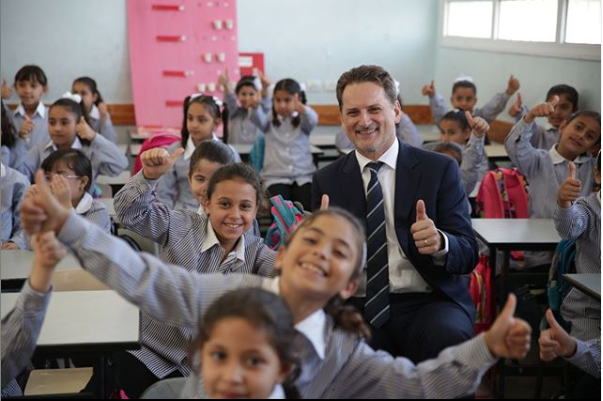FRESH AIR
Decisions need to be made after UNRWA director’s departure
November 8, 2019 | Naomi Levin

It is the perfect time for Australia to review its sizeable contribution to the United Nations Relief and Works Agency for Palestine Refugees (UNRWA), following the departure of its director-general Pierre Krahenbuhl.
In July this year, news emerged of long-standing allegations of corruption, bullying and mismanagement against senior UNRWA figures, including Krahenbuhl.
The allegations were passed to the UN’s Office of Internal Oversight Services. This week, it made some preliminary findings of “management issues”. Details have of the investigation not yet been published. However, based on those findings, Krahenbuhl has been replaced by Christian Saunders, another long-time UNRWA staff member.
Australia is a significant contributor to UNRWA and is at the tail-end of an $80 million, four-year funding deal with the agency.
During October’s Senate Estimates hearings, a senior official from Australia’s Department of Foreign Affairs and Trade confirmed that Australia had not suspended its funding to UNRWA during the investigation.
While Belgium, the Netherlands, and even Krahenbuhl’s own country, Switzerland, all chose to withhold funding to UNRWA during the investigation, Australia did not.
Ralph King, Australia’s former ambassador to Saudi Arabia and Egypt and now a senior Canberra-based diplomat, told Senate Estimates: “The allegations are being investigated by the UN Office of Internal Oversight Services. We’ve spoken to them. We expect full transparency. We are withholding, as we always do, the final tranche of our payment this year, but we have not suspended our payments to UNRWA.”
He added: “We’re waiting for the outcome of that report.”
Given some serious preliminary findings have now been made, it is likely Australia’s Foreign Minister and her Department are thinking seriously about Australia’s future contribution to UNRWA.
It’s difficult to believe that Australians would be pleased to be knowingly contributing – via our foreign aid budget – to international organisations that use those funds to upgrade travel, employ family members and bully co-workers, as UNRWA staff are alleged to have done.
Like other donors, Australia would be wise to consider, and undoubtedly is, the call made by Israel’s Foreign Minister Israel Katz regarding UNRWA. Katz has asked international donors to find new ways to reach those Palestinians who really need assistance.
“UNRWA’s conduct illustrates that the agency is part of the problem, and not part of the solution,” Katz said.
“The international community needs to find a new model that will provide humanitarian assistance to those who truly need it and must remove from the agenda the futile idea of the return of the refugees.”
Aside from these recent findings, serious accusations have previously been levelled at the organisation on three main fronts.
First, that it perpetuates the conflict by discouraging Palestinians from permanently resettling and uses a definition of Palestinian refugees inconsistent with established practice in all other refugee populations. Second, that UNRWA’s remit effectively promises the 5.5 million Palestinians a legally baseless and functionally impossible “right of return” to Israel, making the Israeli-Palestinian conflict more difficult to resolve.
Finally, that it seriously lacks neutrality in its operations, including using anti-Israel, and even antisemitic, texts to teach young Palestinians in UNRWA-run schools and employing members of terrorist groups, like Hamas, as teachers and officials.
Tags: Australia, DFAT, Israel, Krahenbuhl, Palestinian, UN, UNRWA
RELATED ARTICLES

‘Time’s up for talk’: Joel Burnie discusses Antisemitism Envoy’s report on Sky News

‘Optimism’ for Hamas to ‘exile’ their power and create a permanent ceasefire with Israel: Joel Burnie on Sky News

Australian government’s response to Iran-Israel conflict ‘disappointing’: Paul Rubenstein on Sky News




















